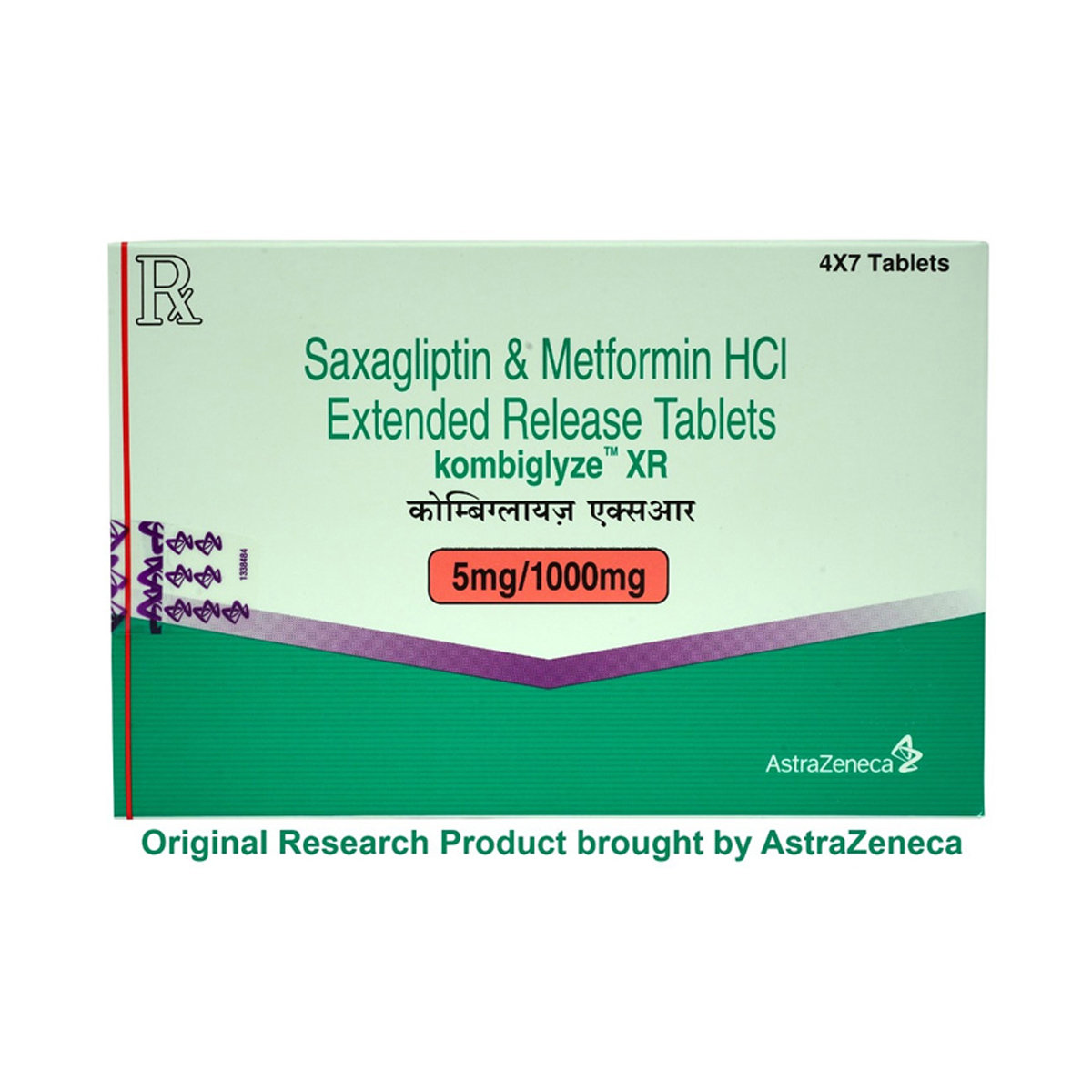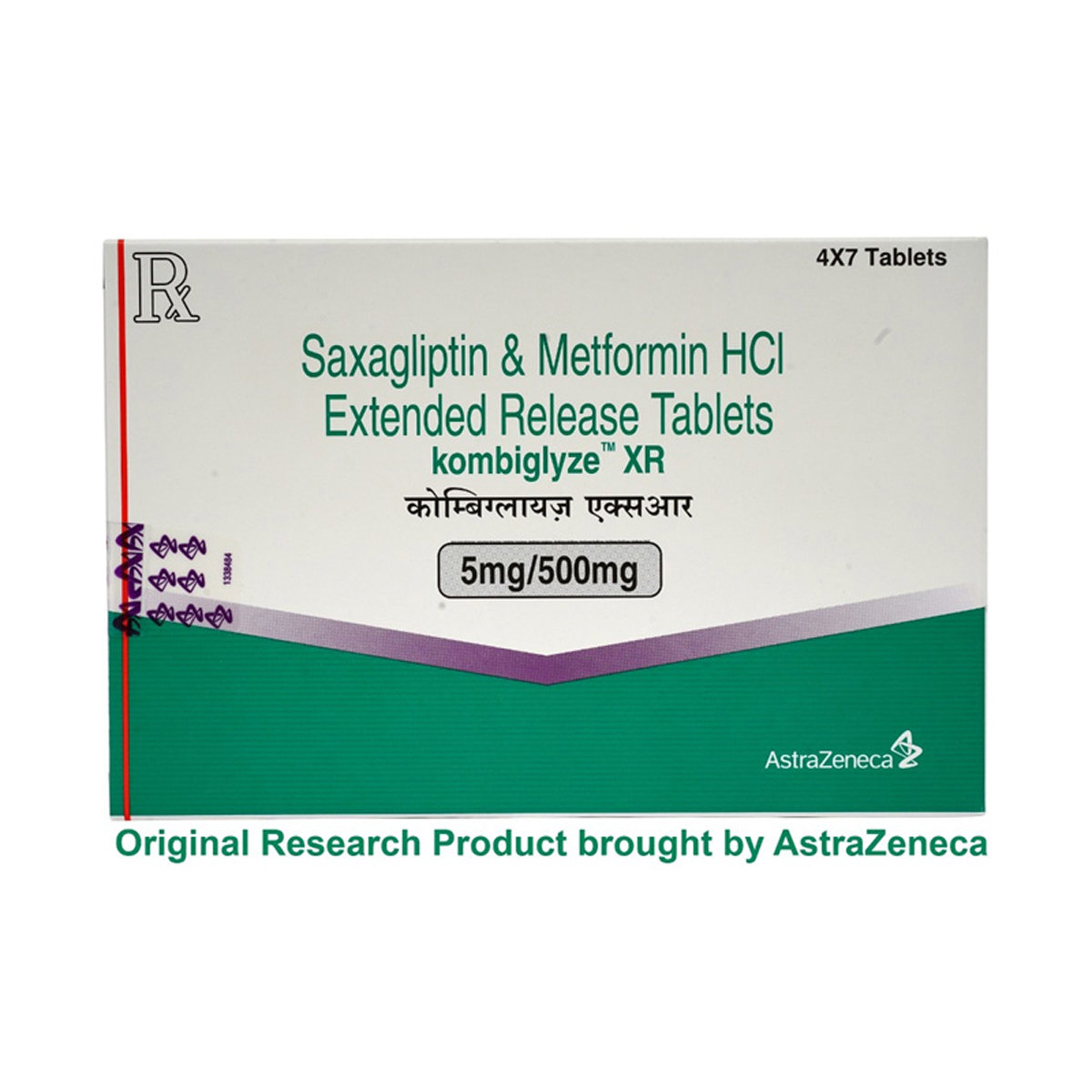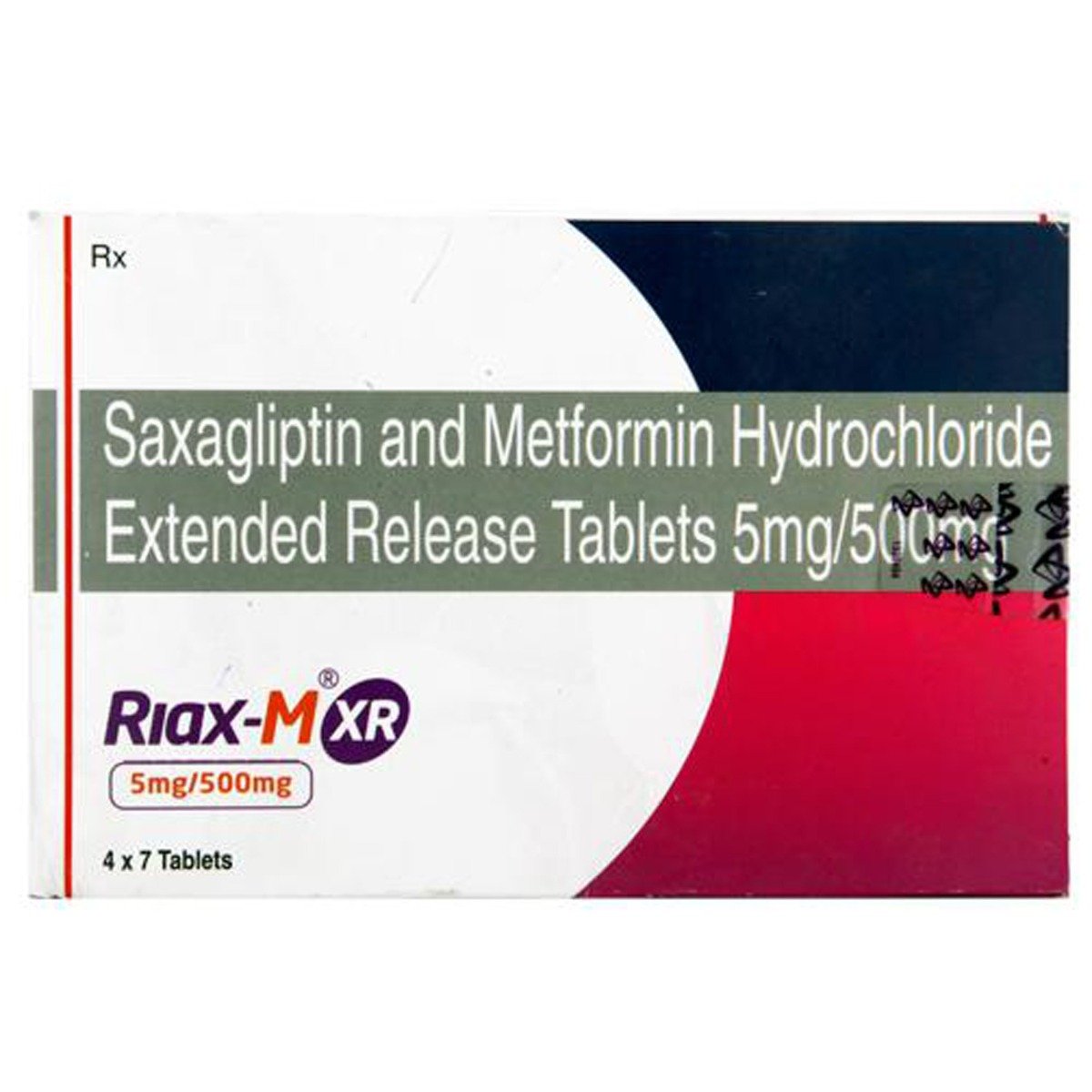Saxagliptin+metformin
About Saxagliptin+metformin
Saxagliptin+metformin belongs to a group of medicines known as antidiabetics, used in the treatment of type 2 diabetes in adults. Saxagliptin+metformin is prescribed for the condition of type 2 diabetes when diet and exercise alone cannot control blood sugar levels. People with type 2 diabetes either do not produce enough insulin, or the insulin produced is unable to perform its function in the body (insulin resistance). Middle-aged or older individuals are most likely to suffer from type 2 diabetes, so it is also known as adult-onset diabetes.
Saxagliptin+metformin contains two medications, namely: Saxagliptin and Metformin. Saxagliptin work by blocking the action of DPP-4/dipeptidyl peptidase-4 (an enzyme which destroys the hormone ‘Incretin’). The enzyme ‘Incretins’ help produce more insulin only when required and reduce blood sugar produced by the liver when not needed. On the other hand, Metformin, a 'biguanide', lowers the liver's glucose production, delays glucose absorption from the intestines, and increases the body's response to insulin. Together, they prevent the blood glucose levels from rising to very high levels, thus keeping your diabetes under control.
You are suggested to take Saxagliptin+metformin for as long as your doctor has prescribed it. The most common side effect of Saxagliptin+metformin is hypoglycemia (low blood glucose levels), upper respiratory tract infection, nasopharyngitis (nose and throat infection with common cold), and headache. Most of these side effects do not require medical attention and gradually resolve over time. If the side effects persist or worsen, consult a doctor.
Saxagliptin+metformin should not be stopped even if you feel better. If you stop taking Saxagliptin+metformin abruptly, it may increase your sugar levels which could further increase the risk of eyesight loss (retinopathy), kidney (nephropathy), and nerve damage (neuropathy). Saxagliptin+metformin should not be taken if you have severe kidney or liver disease. Please inform your doctor if you have any heart disease, are planning to get pregnant or are breastfeeding. Safety and efficacy of Saxagliptin+metformin in children under 18 years have not been established, so it should not be given to them. Patients taking digoxin (a heart medicine) with Saxagliptin+metformin should be closely monitored as severe drug interaction has been observed.
Uses of Saxagliptin+metformin
Medicinal Benefits
Saxagliptin+metformin contains two medications, namely: Saxagliptin and Metformin. Saxagliptin+metformin helps keep your blood sugar levels under check. Saxagliptin+metformin shows optimum effects when taken along with healthy lifestyle changes like weight loss, regular exercise, healthy diet, etc. Saxagliptin+metformin plays a vital role in controlling blood sugar levels and prevents serious complications of diabetes like eyesight loss (retinopathy), kidney (nephropathy), nerve damage (neuropathy), diabetic foot ulcer, and delayed wound healing.
Directions for Use
Storage
Side Effects of Saxagliptin+metformin
- Dizziness
- Sweating
- Palpitations
- Dry mouth and skin
- Hypoglycaemia (low blood glucose level)
Drug Warnings
A prolonged intake of Saxagliptin+metformin may cause acute pancreatitis (swollen pancreas) and critical kidney problem. Increased risk of hypoglycemia (low blood sugar level) can occur when Saxagliptin+metformin is added to other anti-diabetic agents or insulin therapy. In this case, your doctor may adjust the dose of Saxagliptin+metformin. Severe allergic reactions might occur in some patients taking Saxagliptin+metformin, like anaphylaxis, angioedema (swelling under the skin), and exfoliative skin conditions, including Stevens-Johnson syndrome.
Drug Interactions
Drug-Drug Interaction: Saxagliptin+metformin interacts with an anti-depressant (bupropion), drugs used to treat glaucoma, antibiotics (cephalexin, ciprofloxacin), anti-acidity drugs (cimetidine), heart condition drugs (digoxin), anti-HIV drugs (dolutegravir), ethanol, saliva reducing drugs (glycopyrrolate), iodinated X-ray contrast agents, anti-epileptic drugs (topiramate, lamotrigine), heart-related chest medicine (ranolazine). Other drug interactions can contribute to an increased low blood sugar, including sex hormones (androgens), anti-oxidant (alpha-lipoic acid), painkillers (aspirin), anti-TB drugs (prothionamide), growth hormones (pegvisomant), and other antidiabetic medicines.
Drug-Food Interaction: Intake of excessive alcoholic beverages may increase the chance of a life-threatening condition known as Lactic Acidosis. So, avoid intake of alcoholic beverages with Saxagliptin+metformin.
Drug-Disease Interaction: Saxagliptin+metformin should be used with caution in patients with a history of pancreatitis/pancreatic disease and renal dysfunction.
Drug-Drug Interactions Checker List:
Safety Advice

Alcohol
unsafeSaxagliptin+metformin is not advised to be taken with alcohol as it causes bizarre interactions. Both hypoglycemia (low blood sugar) and hyperglycemia (high blood sugar) may occur, depending on how much and how often you drink.

Pregnancy
cautionNo harmful interaction has been reported in pregnant mothers, yet the patient is advised to consult a doctor before taking this drug during pregnancy.

Breast Feeding
cautionNo harmful interaction has been reported in breastfeeding mothers, yet the patient is advised to consult a doctor before taking this drug.

Driving
cautionCaution is to be taken. If a patient feels dizzy while taking Saxagliptin+metformin, do not drive or use any tools or machines. Hypoglycaemia may affect your ability to drive and use machines or work with a safe foothold, and there is a risk of hypoglycaemia after taking this medicine in combination with other medicines known to cause hypoglycaemia, such as insulin and sulphonylureas.

Liver
cautionIt should be used with caution if you have liver conditions. Patients with severe liver problems are advised to take this drug with a doctor's consultation.

Kidney
cautionIt should be used with caution if you have kidney problems. Patients with reduced kidney function are advised to consult with a doctor before taking Saxagliptin+metformin as the doctor may decrease the dose as per his own judgment.

Children
cautionSaxagliptin+metformin is not recommended for children and adolescents under 18 years. It is not known if this medicine is safe and effective when used in children and adolescents under 18 years of age. Consult your doctor for more information.
Habit Forming
Diet & Lifestyle Advise
- Invest at least 150 min of your week in moderate-intensity physical activity or one hour and 15 minutes of high-intensity exercise every week.
- Replace refined carbohydrate-containing foods with whole grain foods and increase intake of fruits and vegetables and other fibre-enriched foods.
- Reduce saturated fat (or hidden fats) intake in food like chips, crisps, pastries, biscuits, and samosas. Choose omega-3 fatty acid-containing oils for daily cooking. For frying, you can use palm oil, mustard oil, groundnut oil, rice bran oil, and safflower oil.
- Avoid taking too much stress as it may elevate your blood sugar level. You can adopt stress management techniques like mindfulness to control stress-related blood sugar changes or meditation or yoga.
- Opt for low-fat dairy products (low-fat yoghurt, fat-free milk, cheese, etc.).
Special Advise
Continue to take Saxagliptin+metformin unless you are advised otherwise by your doctor, as a treatment for diabetes is usually lifelong.
Patients Concern
Disease/Condition Glossary
Type 2 diabetes: It is a condition where the body is unable to make sufficient insulin, or the insulin that it makes doesn't work properly or is utilized by our body. This can cause high blood sugar levels (hyperglycemia). Symptoms of type 2 diabetes include increased thirst, frequent urination, increased hunger, fatigue, and blurred vision. In some cases, there may be weight gain, while in rare cases, weight loss may be observed. The complication of type 2 diabetes includes neuropathy (nerve problems), nephropathy (kidney problems), retinopathy (damaged retina of eyes or blindness), loss of limbs, sexual dysfunction, and increased chance of heart attack or stroke.
FAQs
Yes, Saxagliptin+metformin is known to cause stomach upset, indigestion, nausea, and diarrhoea. To avoid these side effects, please take Saxagliptin+metformin with a meal. Also, Saxagliptin+metformin should be taken at evenly spaced intervals to avoid any unpleasant side effects and for best results.
Saxagliptin+metformin has been reported to increase blood cholesterol levels in a normal patient and thus not recommended in patients with hyperlipidemia.
The patient is advised to take the missed dose as soon as possible; otherwise, jump to the next dose. A patient should never take a double dose to compensate for the missed dose. It may aggravate harmful side effects.
According to American Diabetes Association, most of the studies carried out on Saxagliptin+metformin and its ability to cause cancer resulted in a conclusion that Saxagliptin+metformin is not associated with any form of cancer & hence is safe to use.
A patient who accidentally takes an overdose of Saxagliptin+metformin may experience collapse, seizure attack, and troubled breathing. In such a case, without any delay, emergency health services must be contacted, and medical help should be sought.






